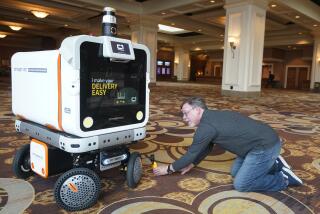It’s Mostly Snore Time at NYC Computer Expo
- Share via
NEW YORK — In a further sign of the technology sector’s tarnished gleam, companies exhibiting their latest wares at this year’s TechXNY convention turned to B-grade show biz gags to lure crowds to their booths.
“It’s all old hat,” said Stephen Widmer, 35, who grimaced as a juggler tossed bowling pins in front of the Veritas Software Corp. display. “They’re showing the same things as last year.”
Last week’s three-day conference, which featured forthcoming computer-related devices and software programs, was a slimmed-down version of its previously sprawling self.
Display booths filled only about half of the cavernous Jacob K. Javits Convention Center, with the remainder of the floor--jammed in previous years--walled off and empty.
Perennial attendee Eugene Voll, 45, said he usually spends an entire day wandering, gawking and loading up on vendors’ pamphlets and giveaways.
This year Voll lost interest after a few hours.
“There was nothing that really made you step back and look,” he said, leaving the showroom with an all-but-empty bag.
Not that there weren’t any new devices on display.
But most were warmed-over versions of products that hit the market long ago.
Forthcoming items, such as Microsoft’s tablet PC software and wireless Mira monitor, had been announced elsewhere.
Microsoft Corp. executive Jeff Raikes opened the conference with a limited demonstration of the company’s Windows XP operating system for the tablet PC, a laptop-like computer that allows the user to enter data with a stylus, translating handwriting into digital text.
Raikes merely announced that the long-awaited software would begin selling on Nov. 7, and that PC makers--such as Fujitsu Ltd., Toshiba Corp. and Acer--would have compatible machines ready by then. Attendees didn’t get to see a test of the software’s accuracy in converting handwriting scrawl into digital text.
Microsoft’s Pocket PC Phone Edition--a combination hand-held computer and cell phone--will start selling this summer, with service by VoiceStream Wireless, Raikes announced.
Kyocera Corp. also displayed a personal digital assistant phone, the 7135 Smartphone, that runs the competing Palm operating system. Its release is expected this fall.
But several companies, including Kyocera, Handspring Inc., Nokia, Research in Motion Ltd. and Audiovox Corp., offered similar devices months ago.
IBM Corp. and Toshiba trotted out devices with built-in Wi-Fi wireless networking, a technology furiously touted last year. Both companies added the capability to laptops, and Toshiba installed it in a $599 hand-held computer, the e740, which began selling last week.
One of the more interesting items was UnitedHome software sold by Listman Home Technologies, a package that allows a home’s stereo system and other electronics to be networked through a PC.
The whole network is controlled from the couch, on the home television screen, by toggling keys on a wireless keyboard.
A consumer version of the software will sell for $200 to $300 in September.
For those seeking to use laptops away from a power source, Toronto’s Electrovaya proffered unobtrusive lithium batteries that promise eight to 12 hours of power for $399 or 12 to 16 hours for $499.
PoGo Products of Brea, maker of an ultra-thin portable CD player and a tiny MPEG video player, also had a trio of tiny MP3 recorder-players that let users skirt copy-restricting technology emerging in some music CDs.
Instead of “ripping” CD tracks with the help of a computer, the PoGo RipFlash devices use a simple patch cord to cleverly grab the CD signal as it’s being played through a stereo.
The simmering war over standards for digital video recording came closer to resolution, with Hitachi Ltd., Panasonic and Samsung announcing they would begin selling multi-format DVD recorders that operate on three competing standards.
The machines, which will begin selling in the fall, will still compete with a fourth format used by Philips, Sony Corp., Compaq, Dell Computer Corp. and others.
Asked which standard might prevail someday, Brandon Jasionowski of the Recordable DVD Council just shrugged.
“Everyone’s stubborn,” he said.




